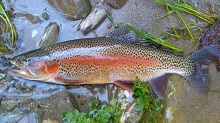Climate Change Effecting Bee Pollination
Canadian Angling.com (September 7, 2010): One of our worst fears regarding climate change is the adverse effects it has on the pollination of crops by bees. Bees are extremely important in the pollination of all pollinating flowering plants and are the major pollinator in ecosystems. Bees pollinate many of the trees and plants in our gardens. It is estimated that bees pollinate 1/3 of the food we consume.
A recent study by the University of Toronto shows the first evidence of a drop in pollination and also points to climate change as the major contributor. The study was completed by James Thomson, from University of Toronto’s department of Ecology and Evolutionary Biology. Thomson started his studies in the 1980’s when he purchased a plot of land in a meadow of glacier lilies. His work over the years has been supported by the Natural Sciences and Engineering Research Council of Canada and the U.S. National Science Foundation.
“Bee numbers may have declined at our research site, but we suspect that a climate-driven mismatch between the times when flowers open and when bees emerge from hibernation is a more important factor,” says James Thomson.
Thomson completed a 17 year investigation into the wild lily in the Rocky Mountains of Colorado. He found a progressive decline in the pollination, especially at the beginning of the season. He compared the pollination during three times each year and compared the fruiting rate of unmanipulated flowers to that of flowers that were pollinated by hand.
“Early in the year, when bumble bee queens are still hibernating, the fruiting rates are especially low,” he says. “This is sobering because it suggests that pollination is vulnerable even in a relatively pristine environment that is free of pesticides and human disturbance but still subject to climate change.”
This could have far reaching effects. There has been a decline in the number of bees and other pollinators over the years and could have a dramatic effect on the world supply of food.
While there may be other factors that are effecting the reduction of pollination, like habitat loss, pesticide use, disease, this now is a major concern.
Study author Thomson did admit that evidence from the study was still weak but said the results were a warning that the phenomenon ‘might be widespread and needs more attention’. ‘It certainly suggests that people who have warned about the possible climate-change consequence of dislocated timing between interacting species have made a reasonable argument,’ he added.
The study will be published in Philosophical Transactions of the Royal Society B: Biological Sciences on September 6.
Wayne Sheridan



